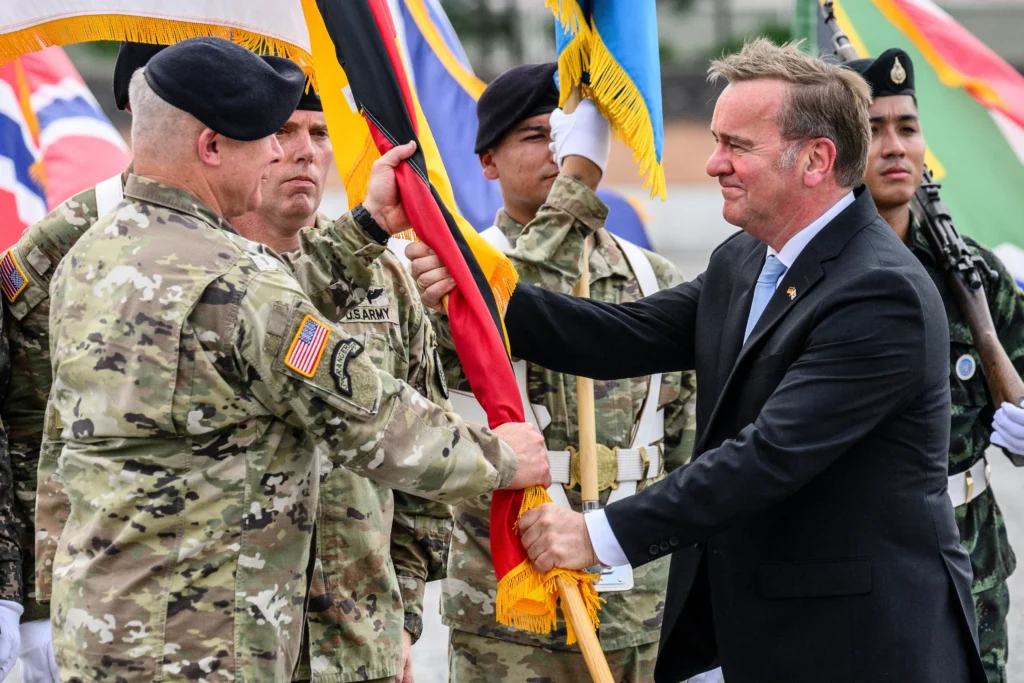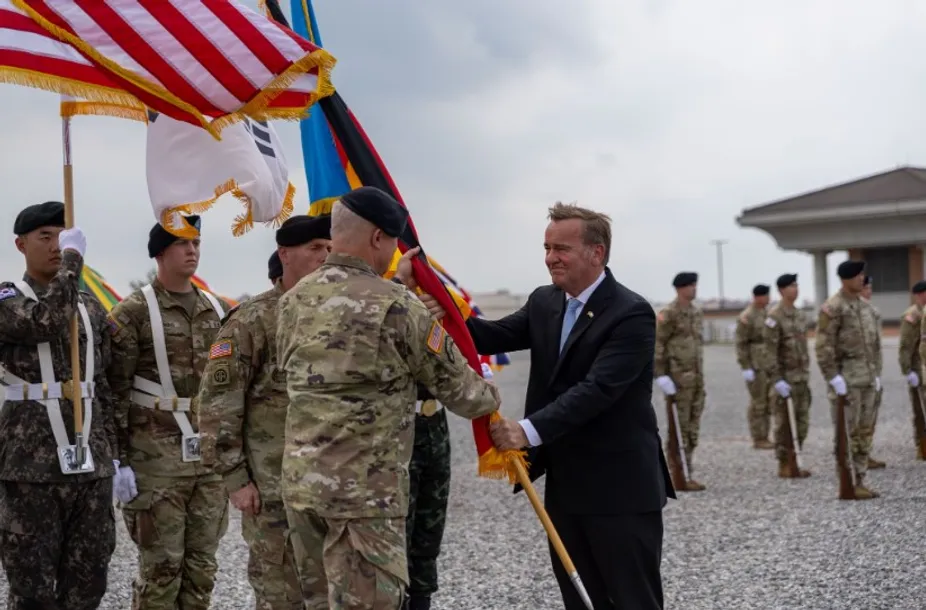Germany Joins United Nations Command in South Korea as 18th Member State
Germany’s Historic Inclusion in the UN Command
On August 15, 2024, Germany officially became the 18th member state of the United Nations Command (UNC) stationed in South Korea. This significant development marks a milestone in international military cooperation, strengthening the allied presence in the Korean Peninsula. The inclusion of Germany reflects a broader commitment to global security and reinforces the ongoing efforts to maintain peace in the region. This move is expected to enhance strategic collaboration and interoperability among allied forces operating under the UNC framework.
Enhanced Cooperation and Strategic Implications
Germany’s entry into the UNC is poised to bring enhanced operational capabilities and strategic insights to the multinational command. As one of the leading European nations with advanced military technology and expertise, Germany’s participation is anticipated to bolster the command’s effectiveness. The UNC, which was established in 1950 to support South Korea during the Korean War, continues to play a vital role in ensuring stability and security on the Korean Peninsula. Germany’s inclusion underscores the command’s evolving role in addressing modern security challenges and fostering international military partnerships.
Diplomatic and Security Considerations
The decision for Germany to join the UNC was reached following extensive diplomatic discussions and mutual agreements. This step reflects the growing commitment of European nations to contribute to global security efforts and to support their allies in critical regions. The presence of German forces in South Korea will not only strengthen the operational capabilities of the UNC but also enhance the diplomatic ties between Germany and South Korea. This collaboration highlights the importance of collective security arrangements in addressing complex geopolitical dynamics.
Future Prospects and Challenges
Looking ahead, Germany’s involvement in the UNC presents both opportunities and challenges. The integration of German forces into the command structure will require effective coordination and adaptation to the existing operational framework. The increased multinational presence may also impact the dynamics of regional security and influence future strategic decisions. As the 18th member state, Germany will need to navigate these complexities while contributing to the overall mission of the UNC.

Why This News is Important
Strengthening International Security
Germany’s accession to the United Nations Command (UNC) in South Korea signifies a major step in enhancing international security. By joining as the 18th member state, Germany brings additional military expertise and resources to the UNC, which plays a crucial role in maintaining peace on the Korean Peninsula. This expanded collaboration underscores a global commitment to security and demonstrates a unified approach to addressing regional and international threats.
Enhancing Multinational Cooperation
The inclusion of Germany in the UNC enhances multinational cooperation and interoperability among allied forces. Germany’s advanced military technology and strategic experience are expected to contribute significantly to the UNC’s operational effectiveness. This increased cooperation is vital for addressing complex security challenges and ensuring a coordinated response to potential threats.
Strengthening Diplomatic Relations
Germany’s participation in the UNC reflects the strengthening of diplomatic ties between Germany and South Korea. This collaboration not only supports regional stability but also highlights the importance of international partnerships in global security. The joint efforts of member states in the UNC underscore the value of collective security arrangements in promoting peace and stability.
Addressing Modern Security Challenges
The addition of Germany to the UNC is a response to evolving security challenges on the Korean Peninsula. As geopolitical dynamics change, the command’s expanded membership allows for a more robust and adaptive approach to security issues. Germany’s involvement will help address contemporary threats and support the ongoing mission of the UNC.
Supporting Global Security Efforts
Germany’s role in the UNC demonstrates a broader commitment to global security efforts. By participating in the command, Germany aligns with international objectives to maintain peace and stability. This move reflects the shared responsibility of nations in addressing global security challenges and supporting allied operations.
Historical Context
Formation of the United Nations Command
The United Nations Command (UNC) was established in 1950 during the Korean War to support South Korea and maintain peace on the Korean Peninsula. Initially formed as a response to the North Korean invasion, the UNC has evolved over the decades to address ongoing security concerns and ensure stability in the region.
Evolution of the UNC’s Membership
Since its inception, the UNC has included several member states, reflecting the global commitment to security and stability in the Korean Peninsula. The command’s membership has grown to encompass diverse nations, each contributing to the collective mission of maintaining peace and addressing regional threats. Germany’s inclusion as the 18th member state marks a new chapter in the command’s history.
Germany’s Historical Role in International Security
Germany has a significant history of involvement in international security efforts. As a major European power, Germany has participated in various peacekeeping missions and military alliances. The country’s entry into the UNC underscores its ongoing commitment to global security and reinforces its role as a key player in international military cooperation.
Key Takeaways from “Germany Joins United Nations Command in South Korea as 18th Member State”
| Serial Number | Key Takeaway |
|---|---|
| 1 | Germany officially becomes the 18th member state of the United Nations Command (UNC). |
| 2 | The inclusion of Germany enhances multinational cooperation and operational capabilities within the UNC. |
| 3 | Germany’s participation reflects a strengthened commitment to international security and regional stability. |
| 4 | The addition of German forces to the UNC is expected to improve strategic collaboration and interoperability. |
| 5 | Germany’s involvement highlights the growing role of European nations in global security efforts. |
Important FAQs for Students from this News
1. What is the United Nations Command (UNC)?
The United Nations Command (UNC) was established in 1950 to support South Korea during the Korean War and maintain peace on the Korean Peninsula. It is a multinational military command that oversees the defense and stability of South Korea.
2. Why did Germany join the UNC?
Germany joined the UNC to strengthen international military cooperation and enhance regional stability on the Korean Peninsula. As a major European nation, Germany’s involvement brings additional expertise and resources to the command.
3. How many member states are currently in the UNC?
As of August 15, 2024, there are 18 member states in the United Nations Command, with Germany being the latest addition.
4. What are the implications of Germany joining the UNC?
Germany’s inclusion in the UNC is expected to improve operational capabilities, enhance multinational cooperation, and strengthen diplomatic ties between Germany and South Korea. It also highlights a broader commitment to global security efforts.
5. What role does the UNC play in modern security challenges?
The UNC plays a critical role in addressing contemporary security challenges on the Korean Peninsula by providing a coordinated and robust military presence. It ensures stability and supports collective security arrangements among its member states.
Some Important Current Affairs Links


















 Exciting News!
Exciting News!  Join Our Telegram Channel Now!
Join Our Telegram Channel Now!
 Join our Telegram channel for a thrilling adventure into the world of daily current affairs.
Join our Telegram channel for a thrilling adventure into the world of daily current affairs. 
 Don’t miss out on the latest updates and insights! Click to join now and be part of the knowledge revolution!
Don’t miss out on the latest updates and insights! Click to join now and be part of the knowledge revolution! 
